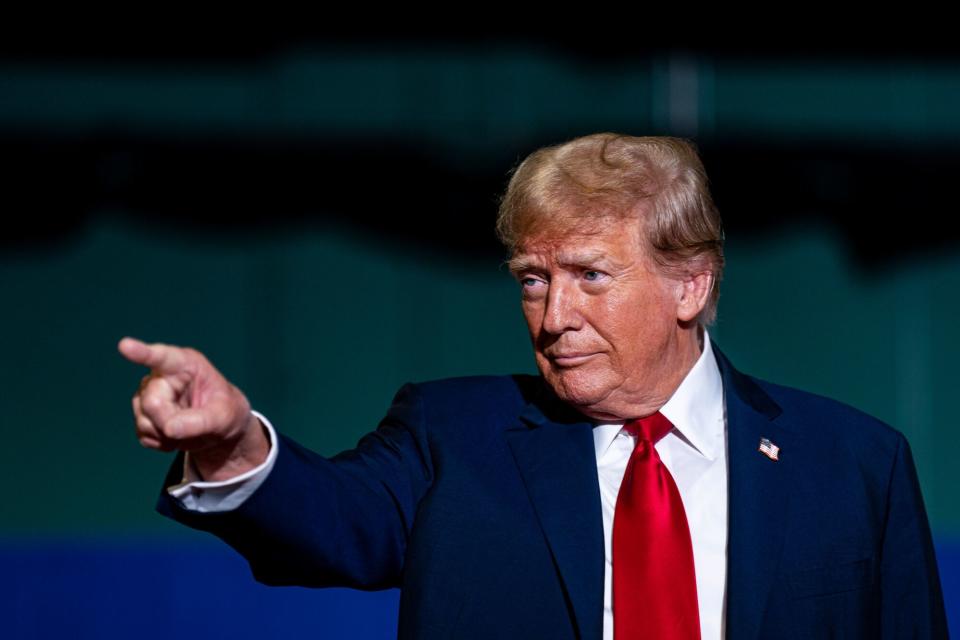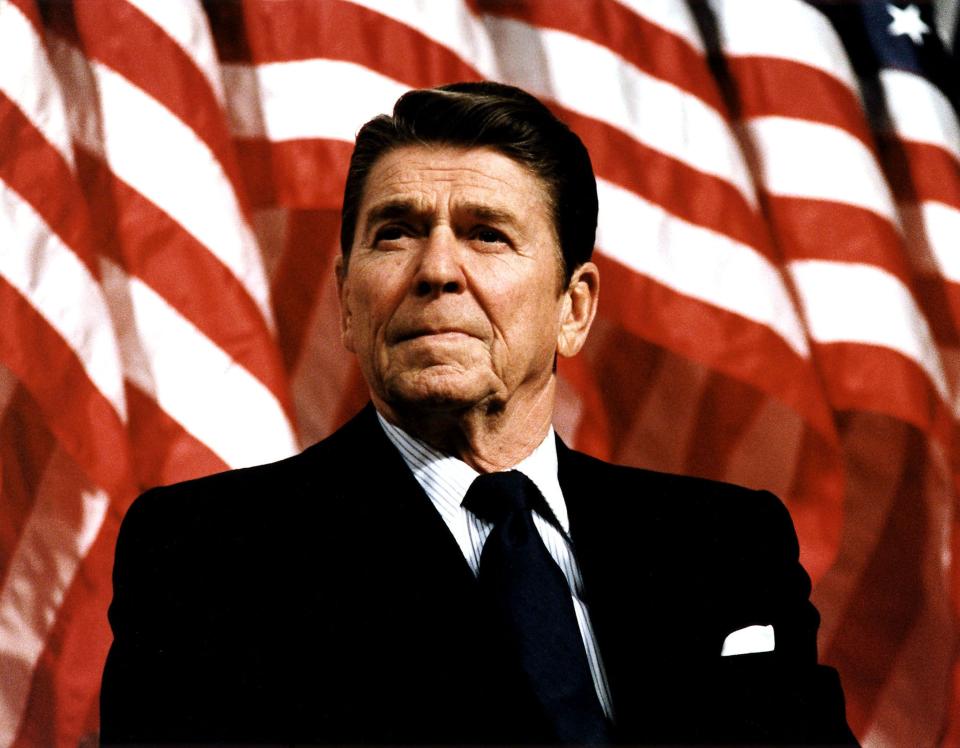Trump Triumph Writes an Epitaph for Reagan Republican Party
(Bloomberg) -- Donald Trump’s sweep through the primaries Tuesday erases any lingering doubt that a Republican Party long-defined by allegiance to Ronald Reagan’s worldview has been transformed into a party singularly dominated by Trump’s.
Most Read from Bloomberg
Chemical Linked to Cancer Found in Acne Creams Including Proactiv, Clearasil
New York to Deploy National Guard to NYC Subways to Fight Crime
Egypt’s Devaluation and Record Rate Hike Put IMF Deal in Reach
Stocks and Bonds Climb as Powell Sticks to Script: Markets Wrap
With Nikki Haley ending her bid, Trump effectively clinches his third consecutive presidential nomination and cements his role as party leader.
“When a party nominates somebody three times in a row, it’s not a fluke or an accident — it’s because the party belongs to him,” said Alex Conant, a Republican strategist and veteran of Marco Rubio’s 2016 presidential campaign.
For decades, Republican politicians faithfully hewed to the platform Reagan established with his 1980 election: the so-called three-legged stool of a hawkish foreign policy, free-market economics and social conservatism.
Trump challenged that orthodoxy when he began his first presidential campaign in 2015 by championing tariffs on imports — particularly from China — sharp immigration restrictions and an isolationist foreign policy. He de-emphasized hot-button social issues such as abortion and same-sex marriage and defended Medicare and Social Security, entitlement programs that generations of conservative Republicans had sought to cut.
Read more: Nikki Haley to End 2024 Bid, Setting Up Trump-Biden Rematch
While many Republicans initially resisted Trump, alarmed by the countless controversies he generated with statements about race, gender, religion and nationality, his appeal to the party’s rank and file and to disaffected voters was powerful. That won him the nomination and a narrow upset victory over Hillary Clinton.
Foreign Policy
As Tuesday’s results illustrate, Trump’s hammerlock on Republicans’ loyalty has endured, despite two impeachments, party losses in congressional elections and his defeat at the hands of Joe Biden in 2020.
“In 2016, Trump launched a hostile takeover of the Republican Party,” said Steve Bannon, who was Trump’s chief campaign strategist that year. “That takeover is now complete.”
Republican pollsters point out that many of Trump’s stances are now reflected in the views of the party’s primary voters, including on issues that were central to the Reagan-era Republican Party such as confronting Russia, projecting US power in the world and free trade.
“The biggest change I’m seeing in our numbers is that Trump has pushed the party in a more isolationist direction both on foreign policy and also from a trade perspective,” said Jim Hobart, a partner at Public Opinion Strategies, a Republican polling company.
Noting Trump’s criticism of U.S. military aid to Ukraine to fend off Russia’s invasion, Hobart cites a January poll his firm conducted that found that almost two-thirds of Republicans oppose further funding for Ukraine. “It’s clearly not Reagan’s party anymore,” Hobart said.
The party’s break from the Reagan-era is further underscored by the poor showing of the GOP candidates who most closely aligned themselves with the 40th president.
Haley, running on a traditional conservative platform and an outspoken supporter of aiding to Ukraine, has failed to electrify Republican primary voters. She’s become steadily less popular with them as the race has gone on. Trump’s former Vice President Mike Pence and former New Jersey Governor Chris Christie, who routinely identified themselves as “Reagan conservatives” in their campaigns, fared even worse: Pence and Christie both dropped out of the GOP race before the Iowa caucuses.
Trump’s triumph will hasten the sunsetting of the Reagan era. Indeed, Hobart points out, the number of Republicans who voted for “The Gipper” is steadily shrinking.
“We forget how far away the 1980s are from today,” he said. “The youngest person who could have voted for Reagan is now 57 or 58 years old.”
Meanwhile, the rising generation of Republican elected officials thought to have future designs on the White House is increasingly Trump-like in political and personal style. It’s a group that includes senators such as Tom Cotton of Arkansas, Josh Hawley of Missouri, and J.D. Vance of Ohio, as well as governors such as Ron DeSantis of Florida and Kristi Noem of South Dakota.
While Haley or another candidate may decide to run again in 2028 as a Reagan conservative or something close to that, it might not get any easier for them. With Trump’s encouragement, the Republican Party has grown hostile even to senior figures such as Mitch McConnell and Mitt Romney, who identify with the Reagan tradition. Romney recently announced he’s retiring from the Senate and McConnell plans to step down as the party’s leader in the chamber after the November election.
“We’re getting rid of the Romneys of the world,” Trump bragged at a recent rally in Richmond, Virginia.
McConnell bowed to the inevitable today. The man who Trump has ridiculed as an “old crow,” said he would back the former president in the general election because it’s clear he’ll be the party’s nominee.
So it is that the Reagan generation shuffles off the stage and leaves Trump standing at its center.
“Every Republican institution of any significant power has now gone full Trump,” Bannon said. “And every important institutionalist has been removed, from Kevin McCarthy in the House to Mitch McConnell in the Senate to Ronna McDaniel at the Republican National Committee. Some people may not like it. But it’s all Trump and his MAGA army now.”
--With assistance from John Harney and Nancy Cook.
(Adds McConnell endorsement in 18th paragraph)
Most Read from Bloomberg Businessweek
How Apple Sank About $1 Billion a Year Into a Car It Never Built
The Battle to Unseat the Aeron, the World’s Most Coveted Office Chair
Humanoid Robots at Amazon Provide Glimpse of an Automated Workplace
Immigration Rage Drowns Out the US Labor Market’s Need for Workers
©2024 Bloomberg L.P.




